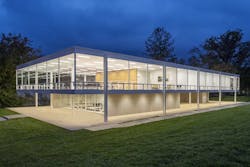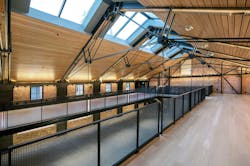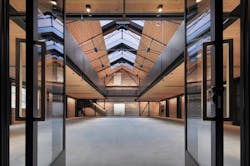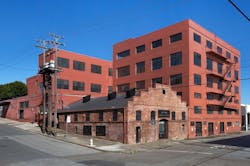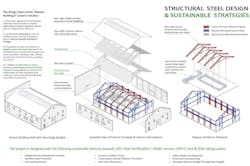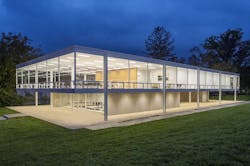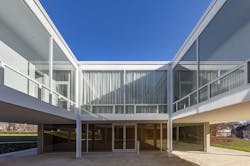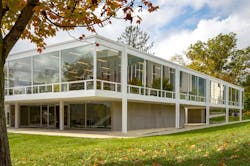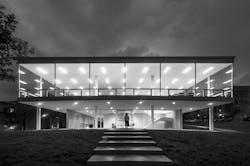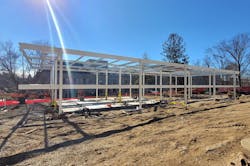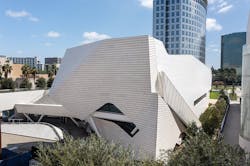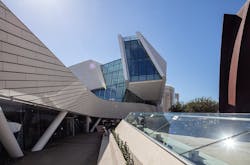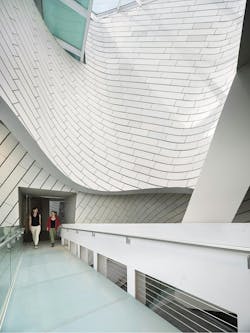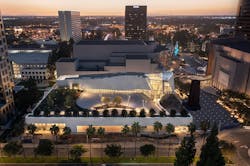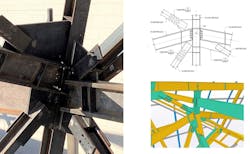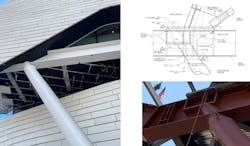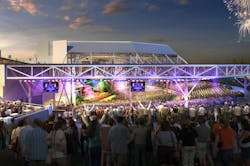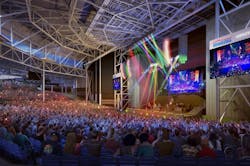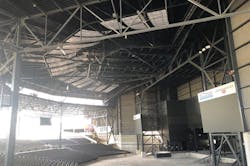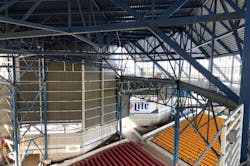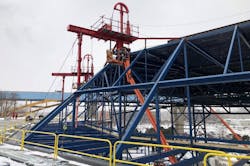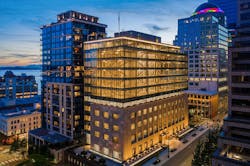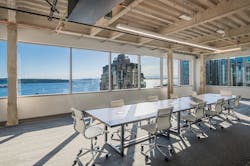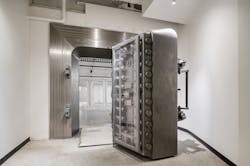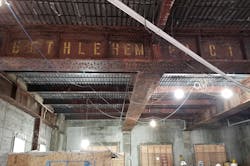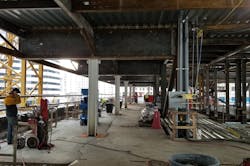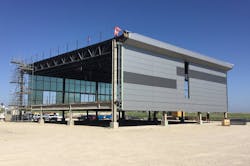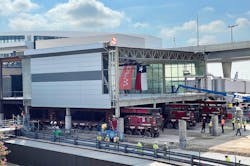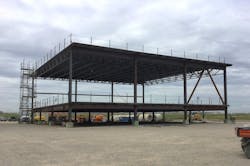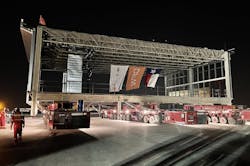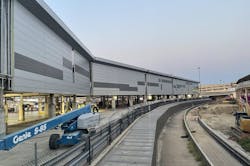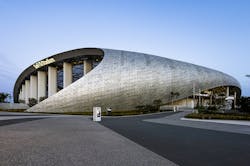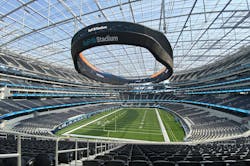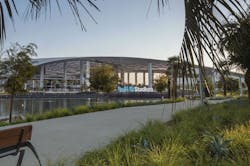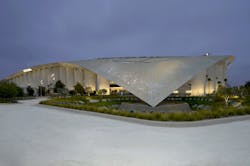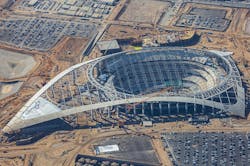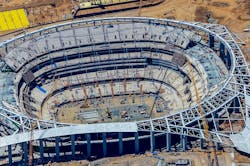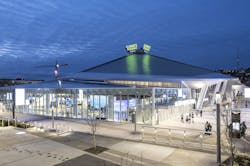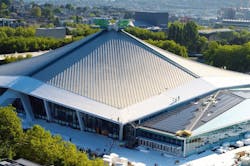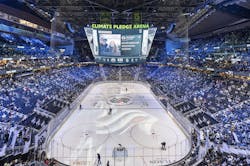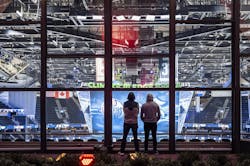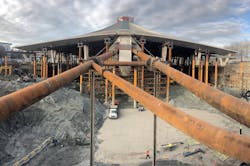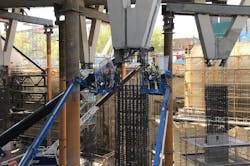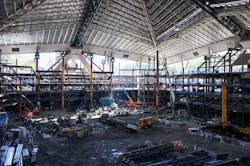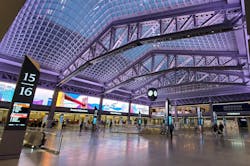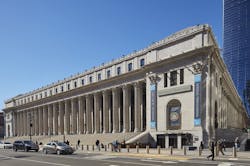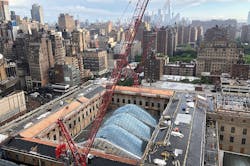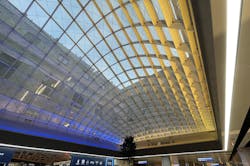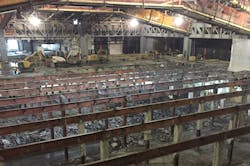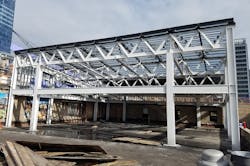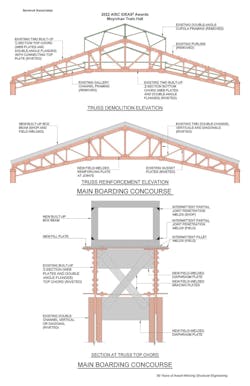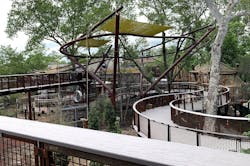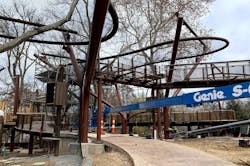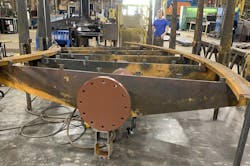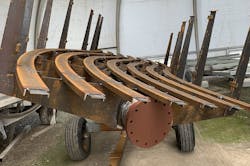Top 10 structural steel building projects for 2023
By BD+C staff and AISC
A jury of five architecture, structural engineering, and construction experts has selected 10 U.S. structural steel building projects as the 2023 winners of the Innovative Design in Engineering and Architecture with Structural Steel (IDEAS²) Awards, hosted by the American Institute of Steel Construction. The annual awards program honors projects that "illustrate the exciting possibilities of building with structural steel and highlight the many ways steel can help express architectural intent while harnessing its unique advantages for both simple and complex structural systems," according to AISC. The winning projects will be featured at NASCC: The Steel Conference, April 12-14 in Charlotte, N.C.
The 2023 IDEAS² Awards jury included:
- David Horowitz, Executive Vice President at Tishman Construction
- Jim Foreman, PE, SE, Senior Project Engineer at Martin/Martin Consulting Engineers
- Mark Trimble, PE, Senior Vice President at AISC
- Anders Lasater, AIA, CEO, Principal Architect at Anders Lasater Architects
- Helen Torres, SE, PE, President and Founder at Helen Torres & Associates Structural Engineers
Here are the top 10 structural steel building projects for 2023 (project descriptions and jury comments courtesy AISC):
Category: Less than $15 Million
NATIONAL AWARD
MacLac Building D (Rebirth of a Historic Paint Factory)
San Francisco
Airy steel trusses and a new mid-height structural mezzanine add state-of-the-art seismic resistance to an unreinforced brick factory from 1906--preparing it for another century of service.
Judge comment:
“What stood out to me on this project is how successful they were at highlighting the existing structure. The brick is beautiful now. It's 100 years old unreinforced, but it wouldn’t have been a very good lateral system for this building nowadays, especially in San Francisco. So they put it in moment frames that don't hide anything. They added a new CLT diaphragm to the floor. They reused old timbers and the trusses for the compression element in the top where you need something stocky but took advantage of steel for the tension bottomed portions of the trusses--a thin, sleek design, something you could only have done in steel that completely lets your eye pass to the historic pieces of the building that remain.” -Jim Foreman, PE, SE, senior project engineer, Martin/Martin Consulting Engineers
Project team:
Owner: Comstock Realty Partners, Los Angeles
Architects: Marcy Wong Donn Logan Architects, Berkeley, Calif.; Peter Logan Architecture + Design/PLAD, New York
Structural engineer: Gregory P. Luth & Associates, Inc. / GPLA, Santa Clara, Calif.
General contractor: RHC Construction, Oakland, Calif.
Consultant: Mark Hulbert Preservation Architecture, Oakland, Calif.
In 1952, Ludwig Mies van der Rohe designed a house for the Pi Lambda Phi fraternity on the main campus of Indiana University in Bloomington, but funding cuts relegated the plans to the MoMA archives. Exactly 70 years later, students now get to enjoy that space--not as a fraternity house, but as a design school.
Judge comment:
“It’s amazing to see that the team was able to honor the original design that Mies had. You can’t separate the idea of steel and the idea of that building--steel is the only thing that could make that building work. When it’s executed at that level, with that sensibility for detail and attention to the original intent of the architect, it’s a magical experience to see a building come together like that.” -Anders Lasater, AIA, architect and principal, Anders Lasater Architects
Project team:
Owner: Indiana University, Bloomington, Ind.
Architect: Thomas Phifer & Partners, New York
SE: Skidmore, Owings & Merrill (SOM), Chicago
GC: CDI Inc., Terre Haute, Ind.
A flowing, irregular structure houses intimate small galleries, a reconfigurable main exhibition space, and a rooftop terrace for large-scale sculptural works.
Judge comment:
“The use of steel throughout the building is both obvious and in some ways obfuscated, which told the jury that the architect and the structural engineers really understand the unique qualities and material capabilities of structural steel and found ways to use it to their design advantage--not just as a structural solution, but really more as a way of expressing and hiding the structure to play with the visitor’s ability to understand the building.” -Anders Lasater, AIA, architect and principal, Anders Lasater Architects
Project team:
Owner: Orange County Museum of Art, Costa Mesa, Calif.
Architect: mOrphosis Architects, Culver City, Calif.
SE: John A. Martin & Associates, Inc., Los Angeles
GC: Clark Construction Group, Irvine, Calif.
Music lovers have raised the roof at Summerfest’s permanent venue since 1987. With modern stage acts requiring more vertical space, the project team had to raise the roof, too--to the tune of 26 ft.
Judge comment:
“It is truly innovative to be able to analyze the existing structure from the 80s, to be able to come up with a cost-efficient system of lifting the trusses and developing the methodology to cut them loose, keep them stable, and to be able to reattach them 26 ft higher than what was originally designed. It's very cost-effective to reuse these existing structures as opposed to the environmental impacts of tearing them down. It's a great example of what can be done with steel in these adaptive reuse situations.” -David Horowitz, executive vice president, AECOM Tishman
Project team:
Owner: Milwaukee World Festival, Inc. (Summerfest), Milwaukee
Architect: Eppstein Uhen Architects, Milwaukee
SE: Larson Engineering, Inc., Wauwatosa, Wis.
Fabricator: Ace Iron and Steel, Inc., Milwaukee *AISC full member*
GC: Hunzinger Construction, Brookfield, Wis.
Detailer: Nu-Way Drafting Corp., Wausau, Wis.
Erector: SPE, Inc., Little Chute, Wis. *AISC associate member*
Consultant: Mammoet (formerly ALE Heavy Lift), Rosharon, Texas
Built in 1949 and retired in 2014 due its outdated security features and minor damage sustained during a 2001 earthquake, this historic landmark now reaches for the sky with seven brand-new floors, a new seismic system, and new steel framing that accommodates the fact that the building has moved during its 70-year lifetime.
Judge comment:
“The ability to connect a new structure over an existing building, and integrating seismic and lateral bracing throughout the existing building, showcases where steel has a truly unique ability to be connected and modified into an adaptive reuse of a building that otherwise could not be brought up to current codes.” -David Horowitz, executive vice president, AECOM Tishman
Project team:
Owner: Martin Selig Real Estate, Seattle
Architect: Perkins & Will, Seattle
SE: KPFF Consulting Engineers, Seattle
Fabricator and Detailer: Metals Fabrication Co., Airway Heights, Wash. *AISC full member; AISC-Certified building fabricator*
GC: Lease Crutcher Lewis, Seattle
Erector: The Erection Co., Arlington, Wash.
Modularization brings a new 80,000-sq.-ft concourse in for a speedy landing in a challenging site.
Judge comment:
“This modular installation is a great way to showcase the efficiency of using steel in a tightly constrained site in an efficient speed-to-market application--and the adaptability of this material to create these modular sections that create open, long-span areas that can be quickly and efficiently assembled.” -David Horowitz, executive vice president, AECOM Tishman
Project team:
Owner: DFW Airport
Architect: PGAL, Addison, Texas
SE: Henderson Rogers Structural Engineers, LLC, Houston
Fabricator, Detailer, and Bender/Roller: Miscellaneous Steel Industries, Kyle, Texas *AISC full member; AISC-Certified building fabricator*
Erector: Acero Construction Services, Kyle, Texas *AISC-Certified erector*
GC: The Walsh Group, Chicago
Consultant: Mammoet, Rosharon, Texas
It takes true innovation to make a below-grade structure surrounded by a 100-ft-tall, mechanically stabilized earth wall feel light, but the SoFi project team did just that. That wall gives the stadium room to safely move during a seismic event at the nearby Newport-Inglewood fault.
Judge comment:
“It's really a special project, and its setting is really thoughtful. The use of the structural steel is almost overwhelming because it in many ways feels as grand and as spectacular as any of the great churches that you may have been in--I hate to sound like I'm saying that it's a church because it's a sporting facility, but in many ways it has a magical quality to it. There's a lightness to it that really elevates the spirit. It's a dramatic experience.” -Anders Lasater, AIA, architect and principal, Anders Lasater Architects
Project team:
Owner: Hollywood Park, Inglewood, Calif.
Architect: HKS Architects, Inc., Dallas
Structural engineer: Walter P Moore, San Francisco
Fabricator/erector/detailer (stadium bowl): SME Steel Contractors, West Jordan, Utah *AISC full member, AISC-Certified building fabricator and erector*
General contractor: Turner Hunt Joint Venture, Inglewood, Calif.
The new home of the Seattle Kraken scores a hat trick: the near-total demolition of the existing structure and construction of a largely below-grade arena while keeping the landmarked façade and iconic roof intact, completed to meet the NHL schedule, with a commitment to being the first net-zero certified arena in the world.
Judge comment:
"The challenge on this project was taking an existing structure, trying to keep the façade and the roof in place while the interior was gutted. There was excavation and an intense amount of shoring to keep the project stable during the construction process and do that on a very short timeframe. That succeeded in large part thanks to early involvement of the structural steel contractor, moving a lot of the decision-making earlier in the timeline of the project and allowing some of the coordination issues to go away before they would have even come up: during construction. There’s a lot of value in steel and a lot of things we can brag about with steel, and this is just a case where that shines." -Mark Trimble, senior vice president, American Institute of Steel Construction
Project team:
Owner: Oak View Group, Los Angeles
Owner’s representative: CAA ICON, Denver
Architect: Populous, Kansas City, Mo.
Structural engineer: Thornton Tomasetti, Inc., Kansas City, Mo.
Fabricator/detailer: LeJeune Steel Company, Minneapolis *AISC full member, AISC-Certified building fabricator*
General contractor: Mortenson, Kirkland, Wash.
Erector: Danny's Construction Company *AISC associate member, AISC-Certified erector*
Civil engineer: DCI Engineers, Seattle
New York once again has a grand rail entrance. The Moynihan Train Hall expands Penn Station into the old James A. Farley Post Office, built in 1912--fortunately, with a steel frame. The project team modified 4,000 tons of existing steel and added 6,000 tons more to transform the 20th-century postal building into a 21st-century transportation hub--and an icon for years to come.
Judge comment:
“What was fascinating is that the structure, which had been perhaps wrapped in plaster for 100-plus years, is now unwrapped and has been exposed to view and becomes part of the sculpture of this beautiful space. It shows the resilience of steel: You can take that 110-year-old truss and still keep it working.” -Helen Torres, SE, PE, LEED AP, president and founder, Helen Torres & Associates
Project team:
Owner: New York State/Empire State Development, New York
Architect: Skidmore, Owings & Merrill, New York
Structural engineer: Severud Associates Consulting Engineers, PC, New York
General contractors: Vornado Realty Trust, The Related Companies, and Skanska, East Elmhurst, N.Y.
Category: Sculptures/Art Installations/Non-Building Structures
MERIT AWARD
Michael and Quirsis Riney Primate Canopy Trails
St. Louis
The project team behind the Michael and Quirsis Riney Primate Canopy Trails weren't monkeying around when it came to seamlessly interweaving steel paths and climbing structures with live trees and other natural elements to give visitors a treetop experience--but the real star of the show is uncoated weathering steel, which can gracefully withstand the seasonal changes of the Midwest.
Judge comment:
“The challenge on this project was the need to have things fit precisely at the locations where they were intended to be--that requires a lot of coordination between the fabricator, the contractor, and the detailer, and a lot of unusual layout techniques. Given the way those walkways snake through the site, the ups and downs, the almost roller-coaster-ride-type curves, I don’t think this project could have been made with anything other than steel. The way the paths are nestled through the trees seems almost natural. And with uncoated weathering steel, it just blends right into the background. It makes me wonder what those monkeys think about when they're looking at us humans as we walk down the path, if they're wondering if maybe we are the monkeys.” -Mark Trimble, senior vice president, American Institute of Steel Construction
Project team:
Owner: Saint Louis Zoo
Architect: PGAV Destinations, St. Louis
SE: Leigh & O'Kane, Kansas City, Mo.
Fabricator: The Gateway Company of Missouri, Berkeley, Mo. *AISC full member; AISC-Certified fabricator*
GC: Tarlton Corporation, St. Louis
Detailer: Nicoloff Detailing, Edwardsville, Ill.
Bender/Roller: Max Weiss Company, Milwaukee *AISC associate member*
Erector: Acme Erectors Inc., St. Louis
Animal Enclosure Consultant: A Thru Z Consulting, Tucson, Ariz.
Learn more about the 2023 IDEAS² Awards winners.
Related Content:
- 13 structural steel buildings that dazzle
- Best of structural steel construction: 4WTC, Fulton Center, Pterodactyl win AISC IDEAS2 Awards
- 12 award-winning structural steel buildings
- 10 building projects win top steel engineering and architecture award
- 12 projects earn structural steel industry's top building award
